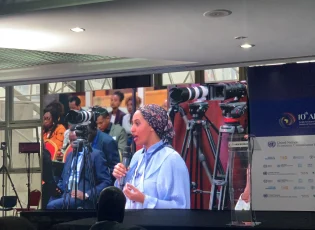Maat Foundation for Peace, Development and Human Rights, in cooperation with the Upper Egypt Association for Active Development in Luxor, held a seminar in the city of Qurna in Luxor under the auspices of Ambassador Ezzat Saad, Governor of Luxor, in which Major General Alaa Al-Harras, Secretary General of the Governorate, and Muhammad Sayed Suleiman, Vice President of the City and Qurna Center, attended in which a number of directors of departments and heads Villages, representatives of NGOs, agricultural associations, natural leaderships, and a number of citizens. Hussein Al-Nazer, head of the Upper Egypt Association for Active Development, stated that the workshop comes within the framework of the activities of the “Citizen's Voice” project, which the association is carrying out in cooperation with the Maat Foundation with the support of the Future Foundation to spread the culture of decentralization in Egypt and inform citizens about it with an emphasis on the importance of integration between the government, civil society and the private sector as partners In achieving development. Major General Alaa Al-Harras, Secretary General of Luxor Governorate, said that decentralization is an indispensable way in the new state, as it gives the governor and governorate officials from the top to the bottom the freedom and speed to make appropriate decisions and meet the real needs of citizens while involving them in setting economic and social development plans, and also makes citizens more conservative in projects. And services because in this case, he feels real ownership of them, and decentralization activates oversight and follow-up on projects by the local administration and also by citizens. Al-Harras added that decentralization provides an opportunity for the elected local people's councils to play an effective monitoring role, in addition to their real participation in setting development plans and setting up the operational plan for health and educational services, electricity, water and sanitation works, and methods that express the real needs of their electors. Al-Harras said that he is against the elections of governors and heads of centers and villages, given that we are not qualified now for this step, and that by virtue of his experience in Upper Egypt and in light of the expectation that the candidates for these positions will be from the people of the governorate, center or village, the elections will come worse in light of sectarianism, tribes, and the control of certain families over political positions. And parliamentary representation, which results in conflicts as we find in the election of the village mayor, and perhaps the people of Upper Egypt agree with me that the sectarianism did not produce qualified representatives to carry out their responsibilities because they view the position from the perspective of social prestige and the position not leaving their families. In his speech, Muhammad Sayyid Suleiman, Vice President of Qurna City, presented the suffering that officials in local government are now facing in order for citizens to hasten access to services, although we have written memoranda and submitted urgent requests to speed up the implementation of service projects and urgent plans to solve problems, but the centralization and return to the higher leaders in the ministries It obstructs and delays the implementation of decisions, and this is something the citizens do not understand. He said that the solution is decentralization, especially in the field of services. He cited the example of hygiene problems and the removal of garbage that are responsible for private companies and also the sanitation problem that now belongs to the Holding Company for Water and Wastewater, which has withdrawn scavenging cars from the local units and is responsible for solving citizens' problems, but the citizens still hold the necks of the local administration to solve their daily problems with sanitation . During the meeting, the citizens' problems were listened to and the problem of farmers who own land that had been implemented and dredged groundwater drainage wells in the areas adjacent to the antiquities were expropriated and the areas dug in the wells were expropriated and a committee was established to estimate compensation for farmers, and yet despite the passage of two years, this has not been disbursed. Compensation. The owners of cracked houses, as a result of the decline in the groundwater level and the failure of the effects, the first beneficiary of this project to compensate the affected. Some of the residents of New Gourna presented the problem of demolishing and collapsing their homes that they received after they were displaced from their original homes, although these homes are modern and only a few months have passed since the receipt of these homes, and they demanded their speedy transfer to safe houses with the rebuilding of these houses and the accountability of the corrupt who caused these Violations and theft of people's money. The work team presented this problem to Ambassador Ezzat Saad, who promised quick and effective solutions to the citizens ’problems.
Set reading font size











